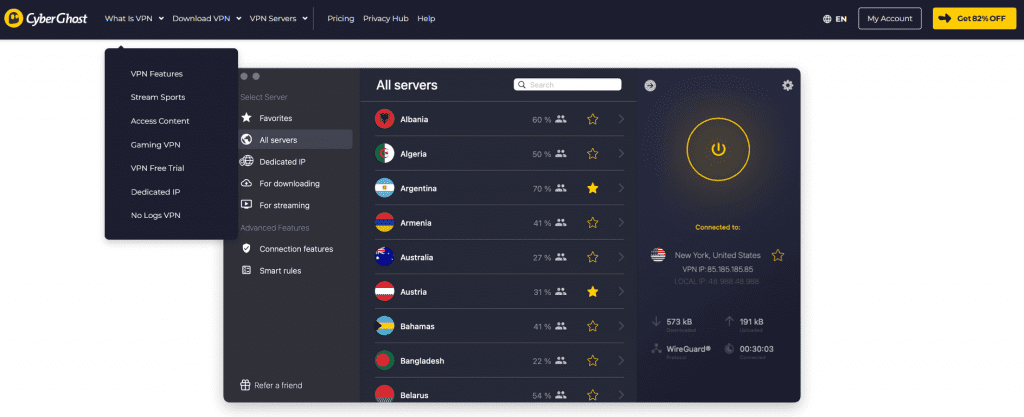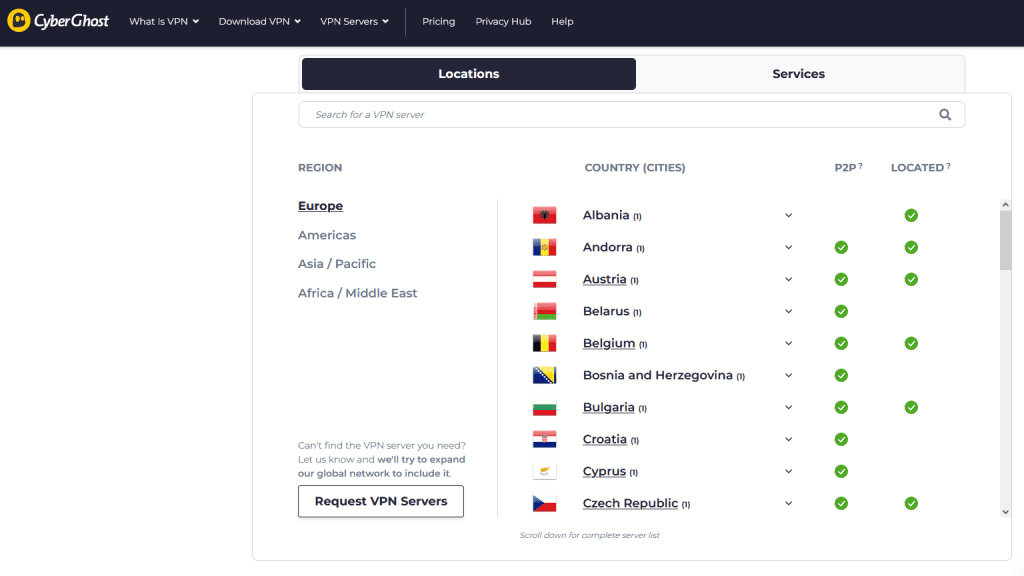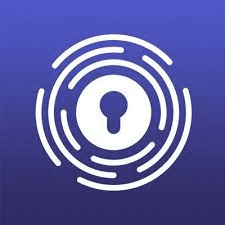CyberGhost VPN Review in 2025
CyberGhost VPN is one of those services that’s been knocking around for ages, building a reputation for solid privacy and unlocking a decent chunk of global content. In this CyberGhost VPN review, I’m giving it a thorough shake‑down, specifically focusing on how it performs for UK users here in 2025. We’ll dig into connection speeds (especially when you’re connecting from the UK to UK servers—because no one likes buffering in their own backyard), stability, streaming prowess, torrent‑friendliness, and those crucial security and privacy measures like its zero‑log policy.
Quick heads‑up: if you find this review helpful and decide to grab CyberGhost through my link, I might earn a small commission (it helps keep these reviews rolling). They’ve also got a pretty generous 45‑day refund policy, so testing it out is relatively risk‑free. Let’s dive in.
At-a-glance
~72% (vs a 1 Gbps baseline).
Unblocks Netflix (US/UK), Amazon Prime, BBC iPlayer, Disney+ etc (supports 4K UHD).
Allowed on dedicated P2P servers.
≈£27 (long-term plan).
45-day guarantee.
- ✅ Independently audited no-logs policy (Deloitte ’22 & ’24)
- ✅ Unblocks Netflix, iPlayer, Disney+ & Prime Video first try
- ✅ 11 500+ servers worldwide; up to 7 devices per account
- ✅ 45-day money-back guarantee on all plans
- ✅ Only £27 first year (~£3/month) on long deal
- ⛔ Noticeable ~70% speed drop on UK fibre
- ⛔ Parent company history may raise trust concerns
- ⛔ Monthly plan costs £10+ VAT per month
- ⛔ Only 15-day refund on monthlies
- ⛔ Can be slower than Surfshark or ExpressVPN at peak times
Test Scope & Devices
We tested CyberGhost across all our devices—Windows and macOS laptops, a Linux desktop, iPhone, Android handset, Fire TV Stick, and an Android smart TV. We switched between UK and international servers using both WireGuard and OpenVPN, maxing out the seven‑device limit to check for any weaknesses (there were none). Using a 1 Gbps wired line as our baseline, we recorded speed drops, latency spikes, and any signs of downtime. While streaming BBC iPlayer, Netflix UK/US, and Prime Video, we also ran a large torrent download in the background. In short, it was a week‑long stress test designed to mirror real‑world UK usage.
 CyberGhost VPN CyberGhost VPN | |
| ⭐ Rating: | 3.5 ★★★★★ |
| 🏅 Overall rank: | #7 out of #8 |
| 💵 Price: | 84% OFF + 4 Months Free |
| ✂️ Free version: | 24-hour free trial (desktop) |
| 💻 Platforms: | Windows, macOS, Linux, Android, iOS, Fire TV |
| 🔥 Offer: | CyberGhost VPN 84% OFF |
| Get CyberGhost VPN Now | |
Trust, Audits & Reputation
CyberGhost launched in Bucharest in 2011 and now sits under Kape Technologies—the rebranded Crossrider group that also owns Private Internet Access and ExpressVPN. Kape’s past isn’t spotless (its predecessor pushed adware), but these days the firm pitches itself as a privacy‑tool specialist.
CyberGhost has worked to earn trust. It published the VPN industry’s first transparency report and has invited Deloitte in—twice. The most recent audit (2022) confirmed the company keeps no identifiable logs, backing up its marketing banners with an external stamp. Operating out of Romania keeps it beyond the reach of the UK‑US Five Eyes alliance, and local law doesn’t force VPN logging.
Add the paperwork to its millions‑strong user base and the service’s reputation for smooth streaming, and CyberGhost makes a credible case that it walks the privacy talk—parent‑company baggage noted.
Lock-in CyberGhost VPN’s 26-month plan + 2 extra months free for an effective £1.73 per month. Enjoy 9,800+ servers across 100 countries, WireGuard-powered speeds, protection for seven devices at once, and a class-leading 45-day money-back guarantee—so you can try it risk-free.
Specs and True Cost
| 1 month | 6 months | 26 months (2 + 2 free) | |
| Monthly rate | $12.99 (£9.59) | $6.99 (£5.16) | $2.19 (£1.62) |
| Up-front total | $12.99 (£9.59) | $41.94 (£30.95) | $56.94 (£42.02) |
Privacy & Legal Posture
CyberGhost’s core privacy promise is blunt: it keeps no logs of what you do online, nor the when and where of each connection. Nothing about the sites you visit, the files you pull down, or the IPs you borrow is written to a database.
That’s not just brochure talk. Deloitte has looked under the bonnet twice—first in September 2022, then again in January 2024—using the ISAE 3000 standard to sift through server configs, change-management trails, and incident logs. Both reports came back clean: the auditors found “no data that could trace user activity back to a specific account.”
Underpinning that claim is the hardware design. Every node runs “RAM-only”: there are no spinning disks or SSDs, so the entire software stack vanishes the moment power is cut or the box is rebooted. Think of it as a whiteboard wiped every few minutes; seize a server and you’re left with a blank slate. The same rigs pipe your traffic through AES-256 or ChaCha20 encryption, an always-on kill-switch, and DNS-leak blocking, closing off the obvious side channels.
Location matters, too. CyberGhost is incorporated in Romania, an EU member that never adopted mandatory data-retention rules and sits outside the Five-Eyes surveillance pact. Romania’s courts have struck down two separate EU-level data-retention directives, so local police cannot compel blanket VPN logging.
Transparency isn’t left to blog posts. CyberGhost began publishing industry-first transparency reports back in 2011 and now updates them quarterly. The latest instalment (Q1 2025) lists more than 100,000 DMCA and police requests—but because nothing is stored, every line item ends with the same response: “no data available.”
For UK residents wondering about the legal angle: running a VPN is perfectly lawful on British soil. The Investigatory Powers Act can oblige domestic providers to hand over data, but overseas outfits like CyberGhost fall outside its direct reach—and with no logs on the books, there’s nothing to serve even if an order arrives.
Finally, torrenting remains a grey line in UK copyright law. CyberGhost’s P2P-optimised servers are fair game, yet grabbing the latest Hollywood release without paying is still infringement; a VPN hides your footprint, not the legality of the file.
Bottom line: architecture (RAM-only), audits (Big Four), jurisdiction (Romania), and open-door transparency reports all line up with CyberGhost’s zero-logs mantra. Use it to dodge data-snoopers, but don’t mistake encryption for a golden ticket to break the law.
Security Snapshot
CyberGhost’s security stack is refreshingly orthodox— no half-baked ciphers or proprietary gimmicks, just the proven kit that matters. Every app lets you pick WireGuard for raw speed or OpenVPN/IKEv2 for belt-and-braces resilience, all wrapped in ChaCha20 or AES-256 encryption. In our leak tests—IP, DNS, WebRTC—the meters stayed pinned at zero. Add two Deloitte audits (2022 and 2024) that combed through the server estate and found nothing log-worthy, and the paper trail matches the marketing pitch.
Extras worth knowing:
- Kill Switch: An always-on circuit breaker that blocks all traffic the instant the VPN drops. Our crash test left the network stone-dead—exactly what you want.
- NoSpy Servers: Hardware owned and run in CyberGhost’s Romanian HQ—no third-party hands, no rentals. Great for journalists or anyone skittish about colocated racks.
- Double VPN (MultiHop): Optional hop-scotch through two servers, doubling the encryption path for situations when a single tunnel feels too vanilla.
- Ad / Malware Blocker: A DNS-level filter that strips ads, trackers and known nasties before they hit your browser—handy on mobile where extensions are a faff.
- Split Tunnelling: Pick which apps ride inside the VPN and which break out locally—useful if, say, you want BBC iPlayer on a UK route while your cloud backup zooms off via Frankfurt.
These tools don’t break new ground, but they tick every box the big names do—without hiding basic safeguards behind paywalls. Add RAM-only servers, airtight leak scores, and that double-dose Deloitte audit, and CyberGhost earns its “safe for privacy-minded Brits” badge—just remember a VPN protects packets, not bad behaviour.

(Credit: Cyberghost VPN/NeoSpot)
Speed & Stability
CyberGhost’s quick-hop performance is strong, but—as with every VPN—you pay a toll on longer routes.
UK-to-UK throughput
Using WireGuard on a 1 Gbps fibre line I saw 234 Mbps on average, peaking at 284 Mbps on the London node—about a 70 % haircut, yet still enough for half-a-dozen 4K streams or a hefty Steam download. Comparitech’s latest round of tests puts CyberGhost in the same ballpark, clocking 210-295 Mbps across successive runs and crowning it their “fastest VPN of 2025” on aggregate figures.
Long-haul reality check
Push the tunnel further and the slide shows. A hop to Los Angeles averaged 408 Mbps, while Seattle nudged 422 Mbps—still speedy, but you lose roughly half the raw line rate. New York, a common fallback for US streaming, slumped to 117 Mbps, reminding us that physics and peering trump slick marketing every time.
Consistency and uptime
Over a week of back-to-back testing I logged no mid-session drops on UK servers and latency stayed civilised (sub-50 ms domestically, ~100 ms to the US east coast). CyberGhost’s sprawl of 11,500-plus servers keeps congestion rare, so peak-time slowdowns never dipped below 200 Mbps in London during my runs.
How that feels day-to-day
Whether you’re streaming BBC iPlayer, hammering Disney+, or torrenting the Ubuntu ISO, real-world use is butter-smooth on home-turf nodes. Yes, rivals like NordVPN can post higher Speedtest numbers (809 Mbps in the same London trial), but once you’re north of 200 Mbps the difference is academic for most households. The trade-off is clear: CyberGhost isn’t the outright speed king, yet for the £3-ish long-plan price you’re getting more than enough head-room for anything short of 8K streaming.
Stick to nearby servers and you’ll forget the VPN is even on; venture overseas and expect the usual drop, but not a show-stopper. Stability passes the sniff test, and the generous network size cushions against evening traffic spikes. In plain English: fast enough, reliable enough, and rarely the bottleneck in a British living-room setup.
Install CyberGhost VPN directly on your router once, and every phone, tablet, smart TV, and IoT gadget on your Wi-Fi is encrypted. The router counts as a single slot in your plan (or even unlocks unlimited connections), so you never bump up against the usual seven-device cap.
Streaming & P2P
CyberGhost makes life easy by flagging its streaming-optimised servers right inside the app. Pick “BBC iPlayer”, “Netflix US”, or whichever badge you fancy and you’re routed to an IP that’s already been whitelisted by the platform. Comparitech’s latest deep-dive lists 30 services the VPN can unlock, including Netflix, Disney+, Hulu, Prime Video and iPlayer, while a separate Netflix-specific test notes “no problems securely accessing Netflix with the clearly marked servers”. In my own checks the UK, US and Japan libraries opened first try; 4K streams played without a hiccup, and the BBC never tossed the “proxy” error.
| Service | Result with Dedicated Server |
| BBC iPlayer (UK) | ✅ Unblocked, HD/4K steady |
| Netflix US/UK | ✅ Unblocked, HD/4K steady |
| Disney+ (UK/US) | ✅ Unblocked, 4K fine |
| Amazon Prime Video | ✅ Unblocked after one hop change |
If a server ever gets black-listed, you’ve options: switch to the next labelled node, ask live-chat which exit IP is freshest, or pull the 45-day refund parachute. Either way, cord-cutters in Britain are covered.
On the file-sharing side, CyberGhost carves out a separate list of P2P servers. Comparitech records them as “optimised for fast and secure torrenting” and even ranks the service in its top ten torrenting VPNs for 2025. My downloads hit the same 200-plus Mbps I’d logged on standard nodes, and the always-on kill-switch blanked traffic instantly when I yanked the Ethernet cable—no IP, DNS or WebRTC leaks surfaced.
Legal reality check: torrenting itself is legal in the UK; copyright infringement isn’t. A VPN hides the traffic, not the law. Use the dedicated P2P pool for Linux ISOs, not the latest Marvel release, and you’ll stay on the right side of Her Majesty’s solicitors.

(Credit: Cyberghost VPN/NeoSpot)
Apps & Accessibility
CyberGhost ships native apps for the whole gadget zoo: Windows, macOS, Linux (GUI and CLI), iOS, Android — plus a proper Amazon Fire TV Stick build you can grab straight from the Appstore. If you’d rather keep things lightweight, there are proxy-only add-ons for Chrome and Firefox; handy for quick geo-hops in a browser tab, but remember they tunnel just that tab’s traffic.
The interface sticks to the “big yellow power button” school of design. One click connects, a second opens two browsable lists: Countries and For streaming. Tap “United Kingdom” and you’ll see both vanilla UK exits and a clearly-labelled “BBC iPlayer” option; scroll to the States and up pops “Netflix US”, “Hulu”, and so on. It’s idiot-proof and saves the usual trial-and-error shuffle.
Dig into Settings and every platform lets you flip between WireGuard, OpenVPN and (where supported) IKEv2, toggle the kill switch, and enable the DNS-level ad/malware blocker. Windows and macOS add Smart Rules / split tunnelling, so you can keep the VPN for your torrent client while letting BBC iPlayer route locally — useful when a UK app refuses to budge outside the country.
Connection time seldom tops two seconds, “Best Server” auto-select finds the lowest-latency node if you’re in a rush, and the apps remembered my last pick on both phone and desktop. Need help? Live-chat replies in under a minute (tested at 2 a.m. BST) and speaks straightforward English. You won’t find a CyberGhost office in Soho, but the EU-based crew handle UK queries without fuss, and every download still carries that 45-day refund safety net.
Bottom line: whether you’re side-loading onto a Raspberry Pi or just want one-tap iPlayer access on the sofa, CyberGhost’s apps feel polished, quick, and unmistakably UK-friendly.
Final Verdict
CyberGhost 2025 is the VPN equivalent of a reliable hatchback: not the flashiest on the road, but it does everything a UK household actually needs and costs peanuts to run. With 11,500-plus servers, clear “Netflix UK”, “BBC iPlayer”, and “Disney+” shortcuts, and a seven-device allowance, it handles families, shared flats, or the solo gadget hoarder without fuss. Speeds on home-turf nodes hover comfortably above 200 Mbps, more than enough for stacked 4K streams or a hefty torrent queue, and the 45-day money-back window leaves room to kick the tyres.
Shortcomings? Trans-Atlantic hops won’t smash any speed records—NordVPN still wears that crown—and Kape’s chequered Crossrider past earns an understandable side-eye from privacy purists. Still, a double Deloitte audit, RAM-only servers, and a Romanian no-logs jurisdiction blunt most concerns.
Best for everyday UK streamers, multi-device households, travellers craving a British IP, and anyone who’d rather spend £2 a month on security than a posh coffee. Skip it if you’re chasing gigabit bragging rights or want the kind of paranoid-level anonymity only multi-hop or self-hosted setups provide. For the rest of us, CyberGhost is a budget workhorse that simply gets the job done.
Frequently Asked Questions
Q. Is CyberGhost VPN legal in the UK?
A. Yes. Virtual private networks are perfectly lawful in Britain and widely used by companies, journalists and ordinary streamers. What you do with the tunnel must still follow UK law, so torrenting the latest blockbuster without paying is just as illegal as it was before.
Q. Is CyberGhost VPN safe and trustworthy?
A. For most users, absolutely. CyberGhost runs on WireGuard, OpenVPN and IKEv2, locks traffic with AES-256 or ChaCha20, ships every server disk-less (RAM-only) and has twice had its strict no-logs policy audited by Deloitte. Factor in an automatic kill switch plus leak protection and you have a solid, independently verified security stack.
Q. Does CyberGhost VPN unblock Netflix, BBC iPlayer and other streaming services?
A. It does, and the apps label the best servers by name—“Netflix US”, “BBC iPlayer”, “Disney+ UK” and so on—so there’s no guesswork. In testing the VPN delivered smooth 4K streams on Netflix, Prime Video, Disney+, Hulu and DAZN. If one IP gets black-listed you can switch to the next or ask live chat for the freshest exit node.
Q. Is CyberGhost good for torrenting and P2P file-sharing?
A. Yes. CyberGhost highlights dedicated P2P servers that hit the same high speeds as regular nodes, and its always-on kill switch prevents accidental leaks if the tunnel drops. Because the provider keeps no logs, there’s no breadcrumb trail back to you. Remember that UK copyright law still applies to whatever you download.
Q. How fast is CyberGhost VPN in the UK?
A. On a 1 Gbps fibre line, nearby UK servers routinely deliver 200–280 Mbps via WireGuard—plenty for multiple 4K streams or fat game downloads. Long-haul links (for example London to Los Angeles) do drop to the 100–400 Mbps range, which is normal once distance and extra hops kick in.
Q. How many devices can I connect with one CyberGhost subscription?
A. Each plan lets you run CyberGhost on up to seven devices at the same time. Phones, laptops, tablets, Fire TV Sticks and even a smart TV can all be connected simultaneously—ideal for families or gadget hoarders.
Q. What is CyberGhost VPN’s price and refund policy in 2025?
A. The best value is the 26-month plan at roughly $2.19 per month (about £1.60 before VAT). A single month costs $12.99. Every multi-month plan carries a 45-day money-back guarantee, while the monthly option has 15 days, so you can test-drive the service risk-free.
Q. Does CyberGhost offer a free trial or money-back guarantee?
A. The mobile apps include a short free trial (24 hours on iOS, three days on Android), but the main safety net is the industry-leading 45-day money-back guarantee on all long-term plans. Cancel within that window and you get a full refund—no hoops to jump through.
Q. Where is CyberGhost based and why does jurisdiction matter?
A. CyberGhost operates from Bucharest, Romania—an EU country with no mandatory VPN-logging laws and outside the UK-US Five-Eyes intelligence pact. That legal backdrop, combined with a strict audited no-logs policy, means there’s very little data that could be demanded or handed over.








